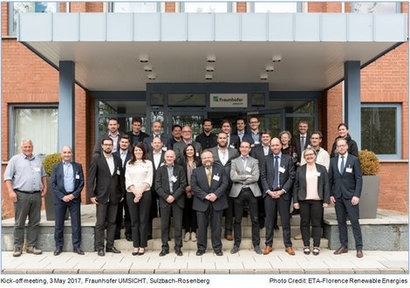
The European Commission’s Renewable Energy Directive for the post-2020 period (RED II), introduced in December 2016, introduced a gradual phase-out of conventional biofuels and set a minimum target for advanced biofuels for transport. This means there is an urgent need to bring innovative biofuels from sustainable raw material to the market.
Twelve SME, industrial, and scientific partners, co-ordinated by FraunhoferInstitute for Environmental, Safety, and Energy Technology (Fraunhofer UMSICHT), are participating in a new ambitious research project named To-Syn-Fuel which will build up, operate and demonstrate the production of Synthetic Fuels and Green Hydrogen from waste biomass. The project will be built and extended from previous framework funding and is designed to set the benchmark for future sustainable development and growth within Europe. It will provide a real example to the rest of the world of how sustainable energy, economic, social and environmental needs can successfully be addressed.
“In this project we want to produce green diesel from waste, which in this particular case will be sewage sludge” said Dr.-Ing. Robert Daschner, Head of the Renewable Energy Department at Fraunhofer UMSICHT and Project Management Officer. “In the next four years we will build-up, operate and demonstrate the technology and by the end of the project we want to have a business case for green fuels in order to support the targets of the European Commission”.
Prof.Dr. Andreas Hornung, Director of Fraunhofer UMSICHT in Sulzbach-Rosenberg and Chair of the Project Board added that the project will stimulate a major change in behaviour in the future use of green fuels and sustainable fuels. With its demonstrator in Rotterdam Harbour, the project will show how simple it is to generate green fuels from biogenic residues and wastes, and also to deliver hydrogen and syngas for future synthesis.
The TCR technology developed by Fraunhofer UMSICHT produces renewable liquid fuels from waste biomass, which can replace fossil fuels. These fuels comply with with European standards for gasoline and diesel EN228 and EN590, which have already been demonstrated on a pilot scale. The TCR technology converts all kinds of residual biomass into three main products: H2-rich synthesis gas, biochar and liquid bio-oil, which can be upgraded. By high pressure hydro-deoxygenation HDO and conventional refining processes, a diesel or petrol equivalent is created in the distillation and is ready to be used directly in internal combustion engines.
The objective is to demonstrate and validate the technical and commercial viability of this integrated approach. The project will combine in one plant TCR, HDO and pressure swing adsorption PSA, together with respective environmental and social sustainability mapping. It aims to create TCR and HDO and the separation of H2 through the combination of a new value chain. Biogenic residues or organic residues will be converted into useful, inexpensive and high-performance synthetic fuels on a demonstration scale.
One hundred such plants installed throughout Europe would avoid GHG emissions equivalent to five millions people per year and divert millions of tonnes of organic wastes from landfill to sustainable biofuel production. The TCR technology therefore opens up long-term opportunities to convert organic waste into renewable fuels and to directly implement these fuels into existing petroleum infrastructure.
The To-Syn-Fuel project is divided into ten landmarks, each associated with a corresponding work package. In addition, the project will increase the acceptance of biofuels and show the general public that the new diesel and gasoline equivalent synthetic fuel is competitive with fossil fuels.
The consortium with 12 partner organisations has brought together some of the leading researchers, industrial technology providers and renewable energy experts from across Europe, in a combined, committed and dedicated research effort to deliver the overarching ambition.
Partners are: Engie Services Netherlands NV, HyGear Technology and Services BV, Slibverwerking Noord-Brabant NV (The Netherlands), Verfahrenstechnik Schwedt GmbH, Susteen Technologies GmbH (Germany), Alma Mater Studiorum - University of Bologna, ENI SpA, ETA–Florence Renewable Energies (Italy), University of Birmingham, WRG Europe Ltd (UK) and Acondicionamiento Tarrasense Assiciation (Spain).
The project has a total duration of 48 months from May 2017 to April 2021 and will be funded by the European Union under the Horizon 2020 programme.
Image: The initial To-Syn-Fuel meeting at Fraunhofer UMSICHT (ETA-Florence Renewable Energies)
For additional information:

